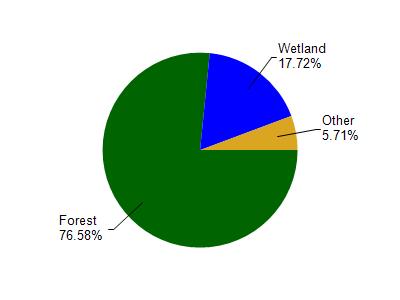Vilas
No
No
No
Fish and Aquatic Life
Overview
Kentuck Lake , in the Brule River Watershed, is a 1,001.13 acre lake that falls in Forest and Vilas Counties. This lake is managed for fishing and swimming and is currently considered impaired.
Date 2011
Author Aquatic Biologist
Historical Description
Source: 1963, Surface Water Resources of Vilas County Kentuck Lake, T-41-N, R-12-E, Sections 27, 28, 33, and 34, Area = 995 Surface Acres, Maximum Depth = 40 feet.
Kentuck lake is a moderately fertile drainage lake. It has slightly alkaline, light brown water of low transparency. The bottom materials consist mostly of sand, with-gravel and rock. Only the outlet stream is considered to be navigable. The principal fish species present are walleyes, largemouth and smallmouth bass and pan fish. Ciscos are also abundant in this water. There is access by town road with parking as well as navigable water access. Public use facilities consist of two resorts with one boat rental facility and a campground. There are 18 cottages located on or about the shore line. The lake is of little significance to fur bearers; however, the lake is significantly used by waterfowl, including puddle ducks, diving ducks, Canada geese and loons on the fall migration. Presently, one-fifth of the total shore line is held in public ownership.
Date 1963
Author Surface Water Inventory Of Wisconsin
Impaired Waters
Kentuck Lake (WBIC 716800) was placed on the impaired waters list for Mercury in 1998 and total phosphorus in 2014. The 2018 assessments showed continued impairment by phosphorus; new total phosphorus and chlorophyll-a sample data exceeded the 2018 WisCALM listing thresholds for the Recreation use and Fish and Aquatic Life use. Based on the most updated information, no change in the existing impaired waters listing was needed.
Date 2017
Author Ashley Beranek
Impaired Waters
Kentuck Lake (716800) was placed on the impaired waters list for Mercury in 1998 and total phosphorus in 2014. The 2016 assessments showed continued excess algal growth; chlorophyll sample data exceed 2016 WisCALM listing thresholds for the Recreation use, however, total phosphorus did not exceed REC thresholds. Total phosphorus and chlorophyll data did not exceed Fish and Aquatic Life listing thresholds. Based on the most updated information, no change in existing impaired waters listing is needed.
Date 2015
Author Aaron Larson
Condition
Wisconsin has over 84,000 miles of streams, 15,000 lakes and milllions of acres of wetlands. Assessing the condition of this vast amount of water is challenging. The state's water monitoring program uses a media-based, cross-program approach to analyze water condition. An updated monitoring strategy (2015-2020) is now available. Compliance with Clean Water Act fishable, swimmable standards are located in the Executive Summary of Water Condition in 2018. See also the 'monitoring and projects' tab.
Reports
Recommendations
Lakes Protection Grant
Kentuck Lake P&R District is sponsoring a lake protection grant to further assess water quality and manage AIS in Kentuck Lake, in Vilas County.
Lake Management Plan Development
Social Survey of Residents or Users
Monitor Water Quality or Sediment
Monitor Invasive Species
Aquatic Plant Monitoring or Survey
Monitor Fish Community
Shoreland Monitoring, Assessment, Inventory
Shoreland Monitoring, Assessment or Inventory
Lakes Planning Grant
Watershed Mapping or Assessment
Management Goals
Wisconsin's Water Quality Standards provide qualitative and quantitative goals for waters that are protective of Fishable, Swimmable conditions [Learn more]. Waters that do not meet water quality standards are considered impaired and restoration actions are planned and carried out until the water is once again fishable and swimmable
Management goals can include creation or implementation of a Total Maximum Daily Load analysis, a Nine Key Element Plan, or other restoration work, education and outreach and more. If specific recommendations exist for this water, they will be displayed below online.
Monitoring
Monitoring the condition of a river, stream, or lake includes gathering physical, chemical, biological, and habitat data. Comprehensive studies often gather all these parameters in great detail, while lighter assessment events will involve sampling physical, chemical and biological data such as macroinvertebrates. Aquatic macroinvertebrates and fish communities integrate watershed or catchment condition, providing great insight into overall ecosystem health. Chemical and habitat parameters tell researchers more about human induced problems including contaminated runoff, point source dischargers, or habitat issues that foster or limit the potential of aquatic communities to thrive in a given area. Wisconsin's Water Monitoring Strategy was recenty updated.
Grants and Management Projects
Monitoring Projects
| WBIC | Official Waterbody Name | Station ID | Station Name | Earliest Fieldwork Date | Latest Fieldwork Date | View Station | View Data |
|---|
| 716800 | Kentuck Lake | 10005972 | Kentuck Lake | 4/16/1988 | 8/19/2021 | Map | Data |
| 716800 | Kentuck Lake | 10052791 | Kentuck Lake - Staff Gage | 7/5/2019 | 11/3/2019 | Map | Data |
| 716800 | Kentuck Lake | 10018823 | Kentuck Lake -- Access Nr Tuttle Rd | 9/6/2004 | 8/30/2025 | Map | Data |
|

Watershed Characteristics
Kentuck Lake is located in the Brule River watershed which is 194.73 mi². Land use in the watershed is primarily forest (76.50%), wetland (17.70%) and a mix of grassland (2.90%) and other uses (2.80%). This watershed has 192.50 stream miles, 2,169.69 lake acres and 13,322.90 wetland acres.
Nonpoint Source Characteristics
This watershed is ranked Low for runoff impacts on streams, Not Ranked for runoff impacts on lakes and Low for runoff impacts on groundwater and therefore has an overall rank of Low. This value can be used in ranking the watershed or individual waterbodies for grant funding under state and county programs.However, all waters are affected by diffuse pollutant sources regardless of initial water quality. Applications for specific runoff projects under state or county grant programs may be pursued. For more information, go to surface water program grants.